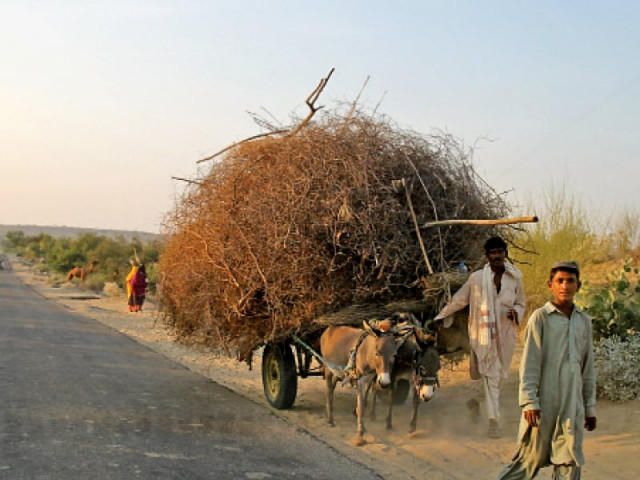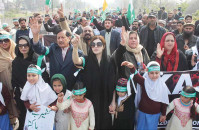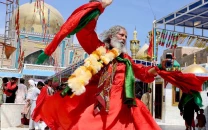Thar's thirst: The Tharis and their worries
All they need is water - but it seems both nature and the govt have neglected them.

When in Thar, look not towards the sky for inspiration. For inspiration lies in the people, the land and the little acts of kindness that bind them together.
An old man migrating back to his village after the drought in 1999-2000 was stopped by a journalist. After the customary introduction and salutations were done with, the old man narrated his story. He was herding his livestock back to his village. Somewhere along the way, one of his sheep fell ill and lay down on the ground. Seeing that the sheep would not be able to finish the journey, he directed his young son to stay with it and catch up with them after it had died.
As morning turned into evening and then into night, the old man grew worried and went back to where he had left his son. He found the young boy shivering out of fright. The boy said that watching the goat's suffering had made him sick.
At this point, the journalist interjected him. "Why did you leave your young son with the goat in the first place?" he asked. The old man looked at him incredulously. "We do not abandon our companions in times of adversity," he replied.
This is a true story. This is Thar's story. The people of Tharparkar are driven by their empathy for others and moved by the need for water.
A man sits at the embankment of a canal filling the water pots of the women's village. When a camel rider comes along, the women shuffle aside, making way for the traveller and his camel so they may drink first. Such is the regard for the needs of others.

The worries
The majority of Thar's residents comprises the scheduled caste of the Hindu minority community. Marginalised for centuries, these semi-nomadic people have learned to make do with whatever they have.
They lead lives simpler than the ABC that they never learnt. Most have never stepped inside a school. Those who have, haven't passed primary school. But they are happy. Well, that is at least what their elected representatives claim.
In reality, for these people, happiness is too strong a word. When people are dying of food-scarcity all around you and you do not know if your child will be next, it is not easy to be happy. Almost every household has suffered the loss of at least one child.
"We are sincerely working for the betterment of these people," claims Khatumal Jeevan, the local MPA. "We are undertaking all sorts of development projects to provide them jobs."
Locals believe, however, that the government is only feigning to show interest in the region because of the media's strong stance over the issue. "There are over 2,325 registered villages in Thar, spread over 22,000 kilometres," claims a local journalist, Khatau Jani. "What the media is reporting at the moment is only the inputs from just five per cent of the region. The number of deaths is expected to be much higher while all the government's efforts are focused in these areas only."
The water connection
For his part, Dr Jeevan claims that the government is serious in its efforts to resolve issues faced by these people. Though he repeats the old rhetoric of reverse osmosis plants and alternate means to provide them with water, he fails to make a concrete case for the claims he makes. He adds, however: "If we manage to spend the development funds in the current budget alone with sincerity and honesty in the region, we will be able to improve a lot." All these people need is water. This precious commodity will alone help them counter the effects of malnutrition. "Water brings prosperity to the land. Various kinds of vegetables sprout in the desert. The livestock flourish with the extra water and so do the people," says Abdul Malik, a resident of Mithi.
It remains to be seen who comes to their aid first. Mother nature with the rains or the Sindh government with its Rs17,633 million development budget for Thar.
Published in The Express Tribune, December 26th, 2014.



















COMMENTS
Comments are moderated and generally will be posted if they are on-topic and not abusive.
For more information, please see our Comments FAQ